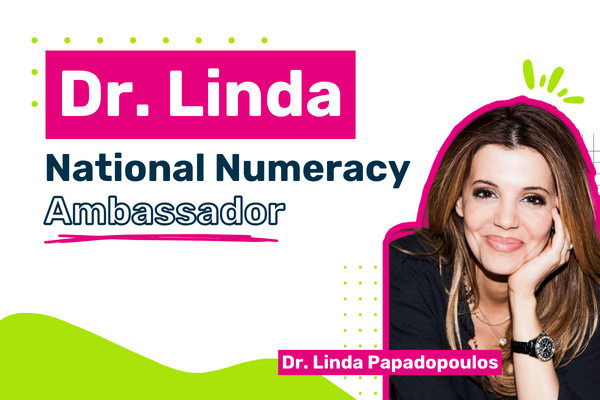Confidence is key
Dr Linda is passionate about exploring the link between psychology and maths and is interested in helping people who think maths is beyond them.
“It all comes down to confidence in the stories we tell ourselves. I think if we've decided we're awful at something, then inevitably, we will be awful. So, for me, it's like anything in psychology. It’s important you change the story you tell yourself and how you react to whatever challenge you have.”
Although Dr Linda has never had a strained relationship with maths, she has a child who is studying pure maths at university, giving her a new appreciation of how its implicated in logic and problem solving.
“I've never been either particularly great or particularly bad at math. My child is amazing at math and seeing a different aspect of it through her eyes gives me a new appreciation of how it helps with the way we observe and solve problems. In fact research suggests that it can help not just with solving mathematical problems but in navigating issues in day to day to life.”
Like most, there have been times when maths hasn’t been a favourite subject.
“But I knew, I felt that it needed to make sense to me. And this is one of the things I'd often tell my clinical students when I worked and I lectured: Maths is a really important part of psychology; it helps you read research articles and understand their validity.”
Find out your ‘why?’
Dr Linda believes that understanding ‘why’ you need numbers is the key to improvement.
“I think you need to find your ‘why’. It might be work-related or life-related. Maths might be crucial to getting finances right and making correct decisions. For another person, it might be wanting to play a sport and trying to figure out how their odds are based on the statistics and figuring that out. I think once you find your ‘why’, you find your ‘how’. And that's what I would encourage people to do.”
Getting confident with numbers allows you to feel more in control
Dr Linda is passionate about people improving their numeracy because it allows them to feel more in control of their lives.
“Like it or not, we use numeracy in daily life. Whether figuring out our finances, trying to make sense of an article we're reading, reading about statistics or polls, or even helping our kids with their homework, numbers are everywhere. And it’s important to feel in control, so things like splitting a bill in a restaurant or understanding how they calculate the interest on your bank statement don’t overwhelm you or become a source of anxiety.”
Step out of your comfort zone!
Linda believes that the key to getting to grips with numbers is confidence and stepping out of your comfort zone.
“I think confidence is important when it comes to improving anything in life. The way that you gain confidence is to face your fears. You do the thing you didn't think you could do. You start off small, and you persevere.”
Be kind to yourself
Maths anxiety affects a lot of us, and Dr Linda believes to overcome maths anxiety we need to be kinder to ourselves.
“I think in order to overcome maths anxiety, you need to find a way of speaking to yourself about maths that allows you to feel that you can progress and grow. If you've decided you're bad at it, and you avoid it, and you don't look at it, you're never going to progress. You need to pivot your thinking from ‘I can’t do it,’ to, ‘I can’t do it now’; it opens that door a little bit.”
It’s also key that learners are realistic too:
“Break things down into smaller chunks. You're not going to go from hating maths to loving linear algebra overnight, break it down step by step. And when you do this, make it meaningful to you; for example, ‘I'm doing this so I can help my grandkids or my kids when they're doing homework’, or, ‘I’m doing this because next time I’m at a board meeting, I don’t want to feel anxious when they bring out a spreadsheet that I can’t read’.
Feelings aren’t facts
This National Numeracy Day, Dr Linda urges you to recognize that feelings aren’t facts!
"‘I feel like I can't get on with numbers,’ does not mean, ‘I can't get on with numbers.’ It's just a feeling. And I think you need to trust yourself instead of trusting your fear. Just because you can't do it now doesn't mean that you won't be able to learn the skills and techniques to do it at some point. So, I think the most important thing you can do for yourself is show up, challenge the negative thinking around it and slowly but surely, move forward.”
Sam Sims, Chief Executive of National Numeracy, said:
“We are delighted to welcome Dr Linda to the National Numeracy team as our newest ambassador. We know people’s relationships with numeracy can be complicated. Dr Linda’s passion for exploring the link between psychology and maths fits perfectly with our own messaging.
“We look forward to working with Dr Linda on exciting future projects and are thrilled that she is so keen to help even more people on their numeracy improvement journeys.”





